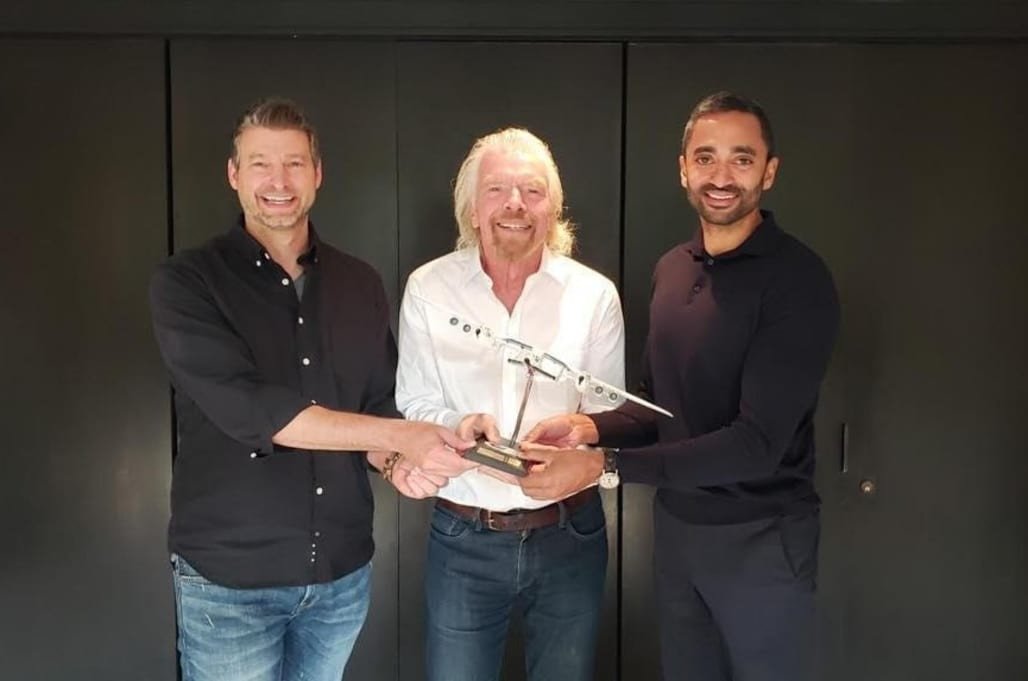Richard Branson UFO business secret
Founder of the Virgin group, Richard Branson, the most famous of English businessmen, upsets the codes and does not deprive himself of any audacity. He exercises his talents in often unexpected directions and sectors, by setting up an original and very effective organization.
Honoring a lost bet in 2010 with fellow Malaysian competitor Tony Fernandes, Richard Branson served the drinks disguised as a flight attendant on an Air Asia flight. Decked out in a mini skirt and fishnet stockings, lips stained with blood red, the English entrepreneur does not deprive himself of any eccentricity for the greatest pleasure of all.
On April 1, 1989, billionaire Richard Branson flew a flying saucer-shaped hot air balloon over London with a dwarf in an alien costume on board. This April Fool’s Day was taken very seriously, the police followed the saucer, the radios were overwhelmed with calls and the army was even alerted.
Richard Branson is not only a talented businessman, he is also a jokester. In April 1989, he had hundreds of fake flying saucers built to fly across the skies of London. Result: panic of the inhabitants and interventions of the police.
Richard Branson, the secrets of a business UFO
Founder of the Virgin group, Richard Branson, the most famous of English businessmen, upsets the codes and does not deprive himself of any audacity. He exercises his talents in often unexpected directions and sectors, by setting up an original and very effective organization. Portrait.
Honoring a lost bet in 2010 with fellow Malaysian competitor Tony Fernandes, Richard Branson served the drinks disguised as a flight attendant on an Air Asia flight. Decked out in a mini skirt and fishnet stockings, lips stained with blood red, the English entrepreneur does not deprive himself of any eccentricity for the greatest pleasure of all.
Richard Branson, an adventurer at heart
A staunch optimist, this exceptional creator of businesses and jobs is an adventurer at heart, he likes to brave dangers and take up crazy challenges – he is the first man to have crossed the Atlantic in a hot air balloon. Extravagant, he likes to make up. He did not hesitate to dress up as a bride to promote a fashion subsidiary. According to Sir Branson, you have to do things seriously without taking yourself seriously, the nuance is significant.
Richard Branson, anything but normal
The leader of Virgin departs from normality in everything he does and undertakes, he seeks the unknown, flirts with the extreme and aims for the unattainable. The intrepid defies the laws of reason and sets no limits to his wildest dreams so that one day they will become reality. In 2004, he launched the concept of space tourism with the possibility of traveling in space aboard the shuttle called Virgin Space Ship. You had to have the audacity to dare to offer space tickets to discover the universe!
The price of this trip is also cosmic, it will take 225,000 euros per ticket, 450 have already been reserved for a very targeted audience. Impossible is therefore not Branson. Its objective is of planetary dimension. Richard Branson and Arianespace are already talking about a project to launch hundreds of satellites to provide Internet access to the whole planet (680 satellites initially placed in orbit at an altitude of 1200 km).
On January 20, Mr. Branson met Geneviève Fioraso, Minister of Research and the boss of Arianespace, on this subject. If the English entrepreneur may seem to have his head in the stars, he is anything but a gentle visionary evolving according to his childish fantasies. Breaking with academic and conventional patterns, this enlightened marginal leaves nothing to chance, although intuition carries him. Fine blade of communication, he excels in this art. For the sake of overall consistency, he embodies his messages and knows how to use his image very skilfully and play with his media coverage. Communication has no secrets for him: he wields all the levers wonderfully to attract people to him, unite and get people talking about him with incredible talent and “so British” elegance.
Richard Branson: the genesis of an atypical career
Richard Branson does not pursue long and prestigious studies and turns away from the school institution at the age of 16. In 1960, he teamed up with his friend Holland-Gems and created the magazine Studends, a provocative publication dedicated to students, the voice of a generation of hippies. Success was not long in coming, he managed to land unpublished interviews: the first issue sold 50,000 copies.
In 1973, he turned to the music industry. He started modestly by selling records by mail order, then opened a shop on Oxford Street and continued the adventure by launching a recording studio. He then demonstrated a very special intuition and signed Mike Olfield, an artist that no one then seemed to interest anyone… The success was immediate: record sales soared with no less than 10 million copies sold and the tube will be included in the film The Exorcist.
This gigantic success will allow him to attract illustrious artists to Virgin Records: Phil Collins, Cultur Club, the Sex Pistols and many others. The construction of the Virgin Megastores network is then underway. The progression is rapid and Branson decides at the beginning of the 80s to diversify its activities in entertainment and show business. Over the years, the British genius created a constellation of companies around the brand with a great heterogeneity of activities. He manages very finely to decline the brand without diluting its strength or impoverishing it: Virgin Airways, Virgin Radio, Virgin Cola, Virgin Direct, Virgin Trains, Virgin Mobile, Virgin Active, Virgin Galactic.
The originality of the organizational model
The size of the company is an essential factor according to Charles Branson. The Virgin empire is not a single company, it is made up of small independent units. For the Anglo-Saxon entrepreneur, small structures are always more flexible, agile and therefore more efficient and responsive than large devices. Each small business has its own financial objectives and has full operational autonomy.
Sir Branson is a builder and not a buyer embarking on multiple external growth operations. The structure at Virgin is not traditional, the companies are arranged in “clusters” and each entity is autonomous. Thus, in the event of financial difficulty, it is simpler and less impactful to cut the branch without having to touch the central tree. Richard Branson therefore favors a minimalist bureaucracy and a short decision-making chain contributing to the efficiency of this flexible and modular organization. The head office itself is reduced to a minimum.
The art of creating a business
Richard Branson encourages you to identify the flaws and the needs to be satisfied in order to position yourself in the niche and upset the established order. He likes to compare the creation of a company to the realization of a work of art: the work of the artist being never finished, it is always in the making and in constant evolution. It invites you to create something exceptional, new, breaking with what preexists. According to him, we must constantly reinvent, renew and recreate.
Through his multiple projects, the serial entrepreneur will experience great successes but also bitter failures. However, he never gets discouraged: he gets up, overcomes them and starts again. Failure is not apprehended as a shameful lack of success to be pillaged: it is not the end of something but the beginning of something else, feeding on this setback. Failure or poor performance humanizes the company and its manager by attesting to a certain fragility.
The Keys to Branson Management
For the English businessman, business leaders do not have a monopoly on good ideas. They must go out, get in touch with others and exchange. Appreciation, recognition and positive reinforcement are powerful management levers. Compliment employees, recognize their actions and reward them. The English manager claims that the most useful lessons are the fruits of mistakes made, provided that they are transformed into a force for action. The axiom of work experienced as a pleasure is central to him.
Read also: Basics of Management | Planning, Organizing, Leading and Controlling
In an interview granted to Inc., an American magazine dedicated to business creation, on the occasion of the release of his book Business as Usual, he declared: “It is important that managers ensure that the people who work for them have fun. Leaders take things far too seriously. They lose sight of the fact that people spend the majority of their lives at work and that it should be fun.
It should almost go without saying. But I’m afraid that in a lot of companies that’s not the case.” Pleasure is therefore an ingredient of success and not the least. Many studies show that employees who enjoy working are all the more efficient and consequently more profitable for the company. The slogan of the giant Amazon exudes this philosophy “Work hard, have fun, make history”.
The ambition to combine the notion of work and pleasure is noble, but isn’t it a sweet utopia in certain professions whose arduousness annihilates the very idea of pleasure? Fulfillment is more easily reconciled with the world of entertainment than with other more austere sectors. Knowing how to surround himself and delegate is essential for him. What can we learn in substance from the management lessons of this impetuous entrepreneur? He orchestrates and directs while remaining in the background. He is a catalyst and federates the energies around him. He surrounds himself with brilliant people. He prefers chaos to order and is always on the lookout for new opportunities and ideas.
Intuitive management and self-organization: reality or utopia?
For Branson, intuition is man’s most natural way of knowing. Intuitive management is part of the perspective of a collaborative business model as it evangelizes it. It works to build a unifying vision to increase employee motivation and promote influence management that breaks with authoritarian management. It campaigns for effective communication, promotes transparency and capitalizes on relational skills (intuition, pedagogy, empathy, etc.).
The essential point is to create bridges between professional efficiency and the human dimension. The entrepreneur has succeeded in mixing methods claiming to be entirely rational and intuitive methods by taking a certain distance with regard to a mechanistic model of the company. The objective is that of self-organization requiring to share the same vision and to have the same orientation tools to converge towards the same place. According to him, the empowerment of the actors of the company makes it possible to obtain results very largely superior to those observed by lavishing orders. This fundamental belief profoundly transforms the DNA of the Virgin organization.
Richard Branson, Steve Jobs, Bill Gates: the twilight of the idols?
Richard Branson, Steve Jobs, Bill Gates or even Lindsay Owen-Jones are the illustration of muses of modern times as the system has created and shaped them. Heroization, a very Anglo-Saxon mechanism, is a very current trend, a symptom of a world lacking benchmarks and in search of new idols. The entrepreneur superhero is a man with extraordinary powers who embodies the company which is personalized and carried by a media icon sometimes symbol of an entire generation. Richard Branson therefore alone symbolizes a success that is nonetheless identified as collective. Why this search for new idols? What are the intrinsic challenges of this search for an extraordinary referent?
An American researcher questioned herself in order to understand how entrepreneurs manage to create and succeed. His work was taken up by a professor of entrepreneurship at EM Lyon, Philippe Siberzhan, in his book Créateur, ne fuyez pas! His reflection sounds the death knell of the myth of the superhero entrepreneur à la Branson or Xavier Niel and consecrates the advent of the concept of “effectuation”.
The desacralization of the brilliant idea and the hero entrepreneur in favor of a vision of entrepreneurship resulting from a social process that is built with others makes success human and therefore accessible. After having established himself in the world of entertainment, having invested in the transport sector and the conquest of space, what new surprises does the bubbling English entrepreneur have in store for us in the years to come? Wait… and see.
Sources: PinterPandai, TwistedSifter, Britannica
Photo credit: Tivad42 (CC BY-SA 4.0) via Wikimedia Commons
Photo description: Palihapitiya with Virgin Galactic founder Richard Branson in 2019.



